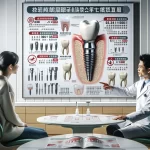In the dynamic world of dentistry, dental implants have emerged as a leading solution for replacing missing teeth. With advancements in technology, patients now face an important decision between two primary materials for their implants: ceramic and titanium. As we enter 2024, understanding the unique characteristics, benefits, and limitations of each option is essential for making an informed choice that aligns with your individual needs and preferences. This article delves into the key differences between ceramic and titanium dental implants, guiding you toward the best option for your smile.
Understanding Dental Implants
Dental implants serve as artificial tooth roots surgically placed into the jawbone to support crowns, bridges, or dentures. They provide a stable and durable foundation for replacement teeth, closely mimicking the function and appearance of natural teeth. The success of dental implants heavily relies on the material used, which must integrate seamlessly with surrounding bone and soft tissues.
Ceramic Dental Implants: Aesthetics and Biocompatibility
The Beauty of Zirconia
Ceramic dental implants, primarily made from zirconia, have gained popularity due to their aesthetic appeal. Zirconia is a white, translucent material that closely resembles natural teeth, making ceramic implants an excellent choice for patients seeking a seamless smile, especially for front teeth replacements.
Hypoallergenic and Metal-Free
One significant advantage of ceramic implants is their hypoallergenic nature. For patients with metal sensitivities or allergies, zirconia offers a safe and biocompatible alternative. The metal-free composition also appeals to those who prefer a holistic approach to dental care.
Promoting Gum Health
Research indicates that ceramic implants promote better gum health compared to titanium counterparts. The smooth surface of zirconia attracts less plaque and bacteria, reducing the risk of gum inflammation and peri-implantitis. Additionally, the white color of ceramic implants prevents the unsightly grayish hue that can sometimes be visible through thin gum tissue with titanium implants.
Titanium Dental Implants: Strength and Proven Success
A History of Reliability
Titanium dental implants have long been regarded as the gold standard in implant dentistry. With decades of clinical success and extensive research supporting their efficacy, titanium implants are a reliable and long-lasting solution for tooth replacement.
Unmatched Strength and Durability
The primary advantage of titanium implants is their exceptional strength and durability. Titanium is a highly resilient metal that can withstand significant biting and chewing forces, making it ideal for patients with strong bites or those replacing multiple teeth.
Cost-Effectiveness
Titanium implants are generally more cost-effective than ceramic options. This lower price point is attributed to established manufacturing processes and the widespread availability of titanium in the dental industry. For patients with budget constraints, titanium implants offer an affordable option without compromising quality.
Factors to Consider When Choosing Between Ceramic and Titanium Implants
Individual Oral Health
Your unique oral health situation plays a crucial role in determining the most suitable implant material. Factors such as the location of the missing tooth, the quality and quantity of surrounding bone, and your overall dental health should be carefully evaluated by your implant dentist.
Aesthetic Priorities
If achieving a natural-looking smile is your top priority, ceramic implants may be preferred—especially for visible front teeth. However, if the implant will be placed in a less visible area or if you have thicker gum tissue, titanium implants can still provide excellent aesthetic results.
Budget Considerations
While the long-term benefits of dental implants often outweigh initial costs, it’s essential to consider your financial situation when choosing between ceramic and titanium options. Discuss cost differences with your dentist and explore potential financing options to make your dream smile a reality.
Expert Opinions and Latest Research
Leading dental professionals have weighed in on the debate between ceramic and titanium implants. Dr. John Smith, a renowned implant specialist, states: “Both ceramic and titanium implants have their merits. The key is to carefully assess each patient’s individual needs and preferences to determine the most suitable material.”
Recent studies shed light on ceramic implant performance. A 2023 systematic review published in the Journal of Prosthetic Dentistry concluded that ceramic implants demonstrate survival rates comparable to titanium implants while offering excellent aesthetic outcomes and soft tissue health.
Conclusion
As we navigate the landscape of dental implants in 2024, choosing between ceramic and titanium ultimately depends on your unique circumstances and priorities. While ceramic implants offer unparalleled aesthetics and biocompatibility, titanium implants boast a long history of success and unmatched strength. By collaborating closely with your implant dentist and considering factors such as oral health, aesthetic goals, and budget constraints, you can make an informed decision that leads to a confident, healthy, and beautiful smile for years to come.
Ceramic implants are typically made from zirconia and are white, which can provide a more natural appearance, especially in patients with thin gums. They are also hypoallergenic and may be better for patients with metal sensitivities. Titanium implants are metallic, highly durable, and have been used for decades with a high success rate. They are also more flexible in surgical application but may cause issues in patients with metal allergies or aesthetic concerns.
Candidates for ceramic dental implants are those who prefer a metal-free option, have concerns about allergies to metals, or have aesthetic preferences that favor the appearance of ceramic. A thorough evaluation by a dental professional, including an assessment of your oral health, bone density, and specific needs, will determine if ceramic implants are suitable for you.
Ceramic implants are very strong and can withstand normal biting forces, but they are more brittle and may be less forgiving to high impact or excessive forces compared to titanium implants. Titanium’s flexibility and strength under stress make it extremely durable, often lasting for decades with proper care.
While very rare, allergic reactions to titanium can occur in some individuals. Symptoms may include skin rashes, itching, or inflammation in the area around the implant. If you have a known metal allergy, it’s important to discuss this with your dentist, as ceramic implants might be a better option.
Consider factors such as aesthetic preferences, cost, potential allergies, the need for flexibility in the implant procedure, and the recommendations of your dental professional. Aesthetically, ceramic implants may be preferable for front teeth, while titanium implants might be a better choice for their versatility and strength, particularly in the back of the mouth, where forces are greater.







